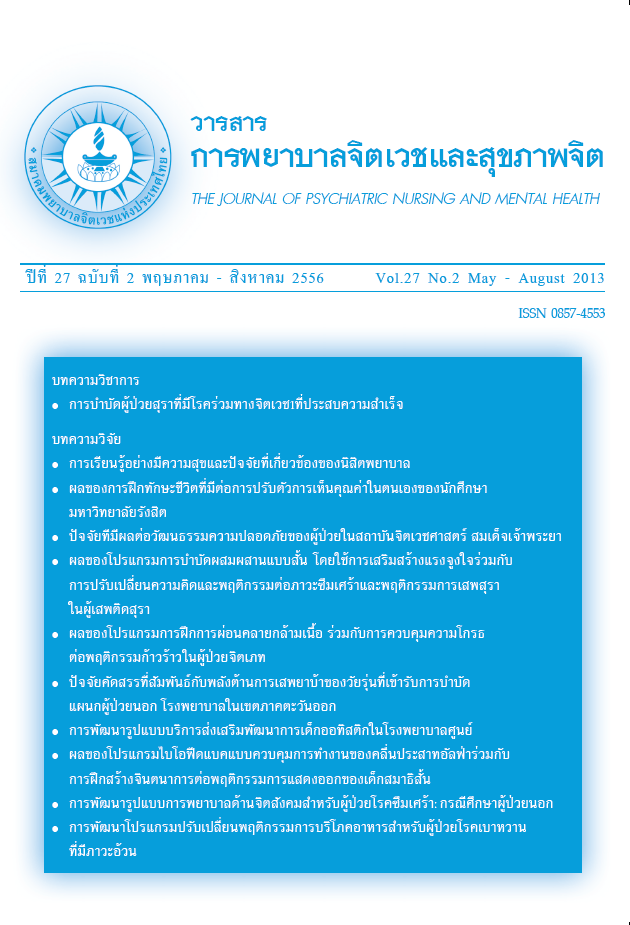การบำบัดผู้ป่วยสุราที่มีโรคร่วมทางจิตเวชที่ประสบความสำเร็จ
Main Article Content
บทคัดย่อ
บทคัดย่อ
การบำบัดผู้ป่วยสุราที่มีโรคร่วมทางจิตเวชมีความยุ่งยากซับซ้อน ทำให้ผลการรักษาไม่ดี ปัจจุบันการรักษาบุคคลที่มีปัญหาจิตเวชและสารเสพติด ยังแยกส่วนกันอยู่ ทำให้การรักษาขาดความต่อเนื่อง กระบวนการจัดการความรู้ มีวัตถุประสงค์เพื่อเสนอแนวทางการบำบัดผู้ป่วยสุราที่มีโรคร่วมทางจิตเวช โดยจัดระบบการบำบัดแบบบูรณาการ 3 ส่วนคือ ผู้ป่วยนอก 1. การคัดกรองปัญหาสุขภาพกายและจิตเบื้องต้น 2. การประเมินความพร้อมในการเลิกสุราของผู้ป่วยแต่ละคน 3. รูปแบบการบำบัดแบบสั้นกระชับ 4. ส่งต่อการรักษาได้ถูกต้องและการให้คำปรึกษาครอบครัวและญาติขั้นต้น ผู้ป่วยใน 1. พยาบาลควรมีความชำนาญในการประเมินอาการถอนพิษสุรา 2. ประเมินความพร้อมของสภาพจิตและสมองก่อนการบำบัด 3. ความพร้อมในการเลิกสุราของผู้ป่วย คำนึงถึงโรคร่วมจิตเวช 4. เน้นการบำบัดทางจิตสังคม แบบสหวิชาชีพ 5. ทีมสหวิชาชีพเตรียมผู้ป่วยและครอบครัวเพื่อการปรับตัวที่บ้าน การติดตามหลังจำหน่าย 1. การติดตามเชิงรุก 2. การดูแลแบบรายกรณี 3. เน้นการมีส่วนร่วมของครอบครัว 4. การติดตามโดยโรงพยาบาลเครือข่าย หรือบุคคลในชุมชน 5. ดึงชุมชนเข้ามามีส่วนร่วม 6. การเข้าร่วมกลุ่มบำบัด 7. การใช้โทรศัพท์ในการติดตามผู้ป่วย 8. การให้ความรู้เครือข่ายในการดูแล 9. เน้นบทบาทหน้าที่ การดูแลติดตาม 10. เน้นระบบการรายงานการติดตามเชิงคุณภาพ สรุปการบำบัดแบบบูรณาการ ควรมีระบบการดูแลตั้งแต่แผนกผู้ป่วยนอกจนถึงการติดตามหลังจำหน่าย เพื่อให้เกิดผลลัพธ์ที่ดีต่อการรักษา
Abstract
Treatment for patients with alcohol used disorders (AUD) with co-occurring disorders (COD) was difficult. It’s complicated treatment lead to poor outcomes. Currently, the treatment system for these patients were separated and discontinued. The process of knowledge management was used. The objective was to present treatment guideline for patients with alcohol used disorders with co-occurring disorders. Integrated treatment was divided into three parts: Outpatient Department (OPD), In-patient Department (IPD), and after care. OPD 1. Basic physical and mental health screening,2. Assessment of the stages of change readiness and treatment, 3. Using brief therapy. IPD 1. Nursing skills for Alcohol Withdrawal assessment, 2. Assessment of psychotic symptoms and cognitive function, 3. Assessment the stages of change readiness and treatment, 4. Screening for co-occurring disorders, 5. Rehabilitation by multidisciplinary team, 6. Multidisciplinary are taking their role. After Care 1. Assertive community treatment, 2. Case management, 3. Family collaboration, 4. Primary health care follow-up, 5. Community collaboration, 6. Group therapy after discharge, 7. Telephone Counseling, 8. Teaching district health network, 9. Quality of report. Summary: Integrated treatmentfor AUD with COD was recommended to produce good outcomes.
Article Details
ประเภทบทความ
บทความวิชาการ
บทความที่ได้รับการตีพิมพ์แล้ว เป็นลิขสิทธิ์ของสมาคมพยาบาลจิตเวชแห่งประเทศไทย


